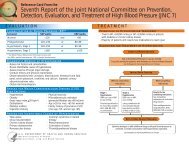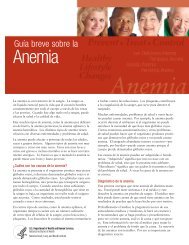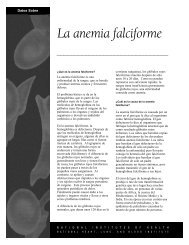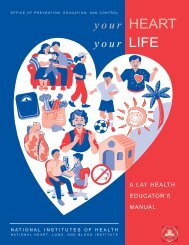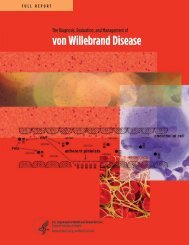WOMEN 'S HEALTH AND MENOPAUSE : - National Heart, Lung ...
WOMEN 'S HEALTH AND MENOPAUSE : - National Heart, Lung ...
WOMEN 'S HEALTH AND MENOPAUSE : - National Heart, Lung ...
Create successful ePaper yourself
Turn your PDF publications into a flip-book with our unique Google optimized e-Paper software.
Of 12 case-control studies (see table 11–5) 18,121–134<br />
for a total of over 5,000 cases, five reported 20–40<br />
percent significant risk reductions among ever users<br />
of HRT. Two additional investigations showed<br />
moderate, nonsignificant inverse relationships.<br />
Studies showing an inverse relationship between<br />
HRT use and colorectal cancer were among the<br />
largest and best controlled ones. The apparent protection<br />
tended to be stronger among recent users.<br />
Differences in RRs by duration of HRT use and<br />
anatomic subsite were not consistent, but the protective<br />
effect seemed stronger in most recent publications.<br />
Available studies support the possibility of<br />
an inverse relationship between colorectal cancer<br />
and HRT, but prevention and surveillance bias cannot<br />
be ruled out. 135<br />
Very few studies have allowed distinguishing<br />
unopposed from opposed estrogen, and all included<br />
few subjects exposed to opposed estrogen only.<br />
Among these, one cohort study 56 and one case-control<br />
investigation 132 suggested an inverse relationship<br />
of opposed estrogen with cancer of the colon,<br />
as for HRT of any type. Differences in RRs by<br />
anatomic subsite were not consistent, but the data<br />
for rectal cancer are scantier than for colon cancer.<br />
Finally, risk reduction has appeared stronger in<br />
more recent publications.<br />
A meta-analysis of 20 studies published up to<br />
December 1996 136 found an overall RR for ever<br />
HRT use of 0.85 (95 percent CI 0.7–0.9). The protection<br />
was greater for current or recent users (RR<br />
0.69, 95 percent CI 0.5–0.9) and users of more<br />
than 5 years (RR 0.73, 95 percent CI 0.5–1.0).<br />
Taken together, available data suggest the possibility<br />
of a real inverse association between colon cancer<br />
and HRT. A causal interpretation of the above<br />
findings is, however, hampered by (1) the timerelated<br />
risk pattern observed; (2) the potential for<br />
prevention bias (i.e., a more favourable pattern of<br />
risk factor exposure) 137 or surveillance bias in<br />
women taking HRT; 8 and (3) lack of clear understanding<br />
of the possible mechanisms of action of<br />
HRT on colorectal mucosa. Postmenopausal<br />
women treated with HRT tend to be of higher<br />
social class and more educated. 137,139 This selection<br />
may imply a healthier lifestyle (e.g., more frequent<br />
consumption of vegetables, higher levels of physical<br />
activity, and lower prevalence of being overweight).<br />
In addition, long-term HRT users are, by<br />
definition, compliant, which is, per se, a favorable<br />
health indicator. 137 (See also ch. 4.)<br />
The inverse relation between colorectal cancer risk<br />
and HRT tends to emerge soon after first exposure<br />
113,127 and seems to level off 5–10 years after cessation.<br />
The apparent protection increases with duration<br />
in some 116,127 but not all 113,132 studies. Such a pattern<br />
of risk seems compatible with the possibility<br />
that HRT acts as a promoting agent. 140 Of the few<br />
studies on precursors for colorectal cancer, a large<br />
prospective investigation 127 found a decreased risk<br />
for large colorectal adenomas but no effect on risk<br />
for small adenomas. Of concern is the possibility<br />
that women may discontinue HRT when symptoms<br />
of disease develop, 138 leaving mainly healthy<br />
women in the category of current users. However,<br />
no difference in risk was found between current<br />
users and recent users (i.e., those who had stopped<br />
HRT in the past 5 years). 113<br />
Sex hormones modify hepatic<br />
cholesterol production and alter<br />
bile acid concentration. 141<br />
Secondary bile acids are believed<br />
to favor malignant changes in the<br />
colonic epithelium, and exogenous<br />
estrogens, which decrease<br />
secondary bile acid production<br />
and can alter intestinal microflora,<br />
could, therefore, protect<br />
against colorectal cancer. Issa et<br />
al. 142 Colorectal cancer<br />
is the most<br />
frequent cancer<br />
in nonsmokers<br />
of both sexes<br />
combined in<br />
Western countries.<br />
suggested that methylation-associated inactivation<br />
of the ER gene in ageing colorectal mucosa<br />
could predispose to colorectal tumorigenesis.<br />
Exogenous estrogen may thus counteract the natural<br />
decline of circulating estrogen in postmenopausal<br />
women. However, data on reproductive and men-<br />
235



